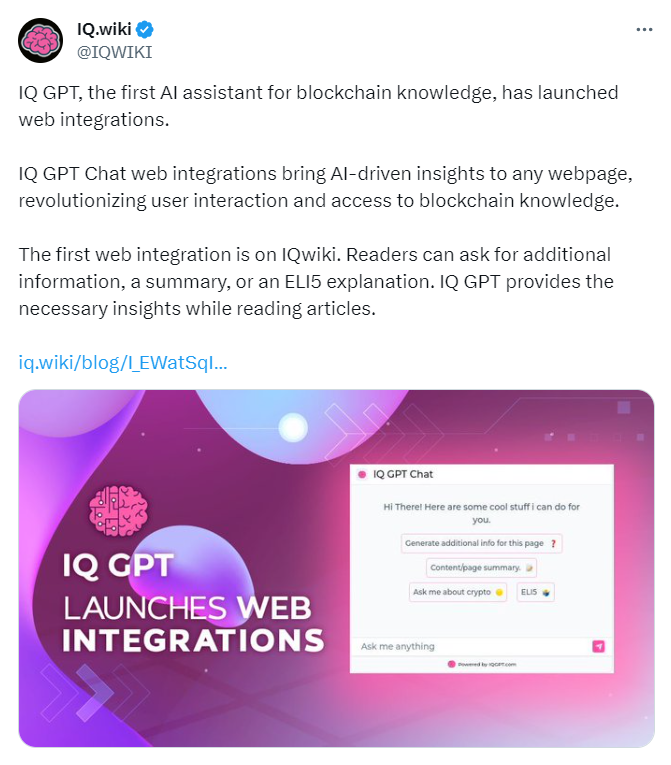The Web3 + AI Newsletter 9

Hello, everyone, and warm welcome to all newly joined subscribers!
This is the Web3 + AI newsletter, where we explore the intersection of blockchain and artificial intelligence. Since, regrettably, I failed to publish last week, I am now delivering a fortnight's worth of updates, partnership announcements, and regulatory news. I am also sharing some reflections and theories on blockchain + artificial intelligence progress acceleration.
Thank you for being here! Let's dive in!
What's New in the Web3 + AI Startup World?
Casper Labs and IBM to Integrate Web3 and AI
Although crypto was greatly overshadowed by AI at this year's World Economic Forum, blockchain company Casper Labs organized a series of important discussions on ETFs, tokenization, ZKPs (zero-knowledge proofs), and gaming. I invite you to watch the recordings here. They also used the occasion to promote their strategic partnership with IT giant IBM, aiming at employing blockchain to enhance AI governance and transparency.
The two companies want to help enterprise clients in their quest to better authenticate and validate training data through the integration of inherently immutable and transparent blockchain technology.
Together, Casper Labs and IBM Consulting plan to develop a new Casper Labs solution, designed with blockchain and built leveraging IBM watsonx.governance, that establishes an additional analytics and policy enforcement layer for governing AI training data across organizations.
A beta version is expected to come out in Q1 of 2024.

Telefonica Allies with Helium to Power Mobile Hotspots
Announcements like this one featuring major Web2 players are just another proof that DePIN (Decentralized Physical Infrastructure Network) is going to be one of the buzzwords of 2024. The telecom behemoth Telefonica has partnered with decentralized phone service Helium Mobile to deploy crypto-incentivized wireless hotspots.

The project's pilot locations are Mexico City and Oaxaca, as its primary goal is to offload mobile data onto Helium Network and, thus, extend Telefonica's coverage.
This solution enables select Movistar customers in Mexico to access the Helium Mobile Network using their Movistar SIM cards for authentication.
Helium Mobile is a spin-off of the Helium network that rewards users who run nodes or hotspots with crypto tokens on the Solana blockchain.
AI-Powered Game EXVERSE Integrates with Aethir
The Web3 + AI shooter game EXVERSE, built by Immutable, has partnered with Aethir to use its decentralized cloud infrastructure (DCI) and thus enhance the game's accessibility and user experience.
This partnership enables Exverse to utilize Aethir’s DCI expertise to reach every single gamer around the globe - welcoming them into the massive gaming experience without worries of end-user hardware limitations.
The gaming company expects an influx of new players thanks to Aethir's alternative and cost-effective cloud solution catered to latency-sensitive industries like AI and gaming.

Web3 + AI Assistant IQ GPT Launches Web Integrations
IQ GPT, an AI assistant built by the “world's largest” blockchain encyclopedia IQ.wiki and promoted as the first AI assistant for blockchain knowledge, can from now on be integrated into every webpage. Thus, every crypto data provider or aggregator can use it to deploy a chatbot and streamline its users experience to an unprecedented extent.
This means that any webpage, from decentralized exchanges to DeFi applications, cryptocurrency projects, NFT platforms, data platforms, and more, can now feature IQ GPT in the form of a chatbot on their website.
Moreover, in their announcement, the IQ.wiki team confirmed they have much more ambitious plans for the assistant:
In tandem with these advancements, IQ GPT has secured exciting partnerships to further enrich the user experience. The team behind IQ GPT envisions its evolution into an indispensable tool for everyone in the crypto/blockchain industry, akin to the role the Bloomberg terminal plays in the financial sector.

Gnosis Chain's AI Ecosystem
Gnosis Chain, one of the first Ethereum sidechains, has been consistently fostering the development of a rich AI ecosystem, and its efforts are already paying off. Over the last quarter, the team has started showcasing the AI dApps and projects building on top of the chain as part of the Gnosis AI call, held on the protocol's Discord server.
I will be sharing these demos with you starting with the January one focused on Brian AI - an AI assistant capable of performing noncustodial transactions, researching Web3 information, and deploying smart contracts by prompt.
Brian is designed specifically for Web3 interactions and can be asked to swap tokens, bridging across many chains. Moreover, it delivers the advantage of bridging to another chain and transferring the required amount in a single transaction. In the realm of smart contracts, Brian can generate Solidity code, but can also be used for editing and deploying contracts. Verifying smart contracts across multiple chains is a part of its arsenal as well. The Brian API is already available if you want to integrate Brian into your application or website.
EMC Closes 1st Multi-Million Investment Round
The AI + DePIN project EMC (Edge Matrix Computing) announced today the successful closing of its first investment round led by Swiss Bochsler Group and Future3 Campus, among others. The exact amount of the funding was not disclosed, but it is in the “multi-million” range.
This fundraising success will start 2024 off by helping EMC accelerate the expansion of their computing node network as well as their AI application development environment and developer community.
EMC is an interesting case because it develops both AI products and the associated decentralized computation infrastructure under the same hat, which results in the integration of “the entire value chain for the AI computing sector”. It was jointly incubated by Wanxiang Blockchain and HashKey Capital.


Noteworthy Podcasts, Articles, Events
AI Regulation: EU's AI Act and CoE's AI Convention
The final text of the European Union's long-awaited AI Act was leaked a few days ago, but no member-state has provided any feedback yet. The bill is set to be voted by COREPER (EU's Committee of Permanent Representatives) on February 2nd, although some countries may try to delay it.

However, the establishment of the EU AI Office - the body potentially responsible for enforcing the AI Act, is already on the way. Still,
(...) the question of how much autonomy the Office will be guaranteed remains sensitive inside the Commission, especially since it is unclear whether it will become an entity with its own political objectives or an extension of the unit responsible for the AI Act.
In the meantime, the Council of Europe (CoE) - the international human rights organization with 46 member states, is also preparing its Convention on Artificial Intelligence, Human Rights, Democracy, and the Rule of Law. The European Commission is mandated to negotiate within CoE on behalf of all EU members and pushes to align the Convention with EU's AI Act. However, the USA, as an observer country, insists on limiting its scope to public bodies only.
Since the beginning, the United States, the homeland of the world’s leading AI companies, has been pushing to exclude the private sector from the treaty, which, if ratified, would be binding for the signature country.
The United States is not a CoE member but participates in the process with an observer status. In other words, Washington does not have voting rights, but it can influence the discussion by saying it will not sign the convention.
Countries like the UK and Japan are supposedly not going to sign if the private sector is kept in.
Strong Signals in Support of Open-Source AI
Last week, Mark Zuckerberg announced that his company Meta is entering the race to achieve AGI (Artificial General Intelligence), but unlike competitors OpenAI or DeepMind, it bets on open-source AI development.
“Our long-term vision is to build general intelligence, open source it responsibly, and make it widely available so everyone can benefit,”
That statement is in line with the values and objectives of the AI Alliance formed back in December by Meta, IBM, Hugging Face, the Linux Foundation, and others. It remains to be seen if Zuckerberg's Meta will indeed release its models to the wide public, and to what extent.
Meanwhile, this week, Hugging Face shared the news of their open AI collaboration with Google Cloud.
We will collaborate with Google across open science, open source, cloud, and hardware to enable companies to build their own AI with the latest open models from Hugging Face and the latest cloud and hardware features from Google Cloud.

That last partnership is especially interesting, since Google has so far been positioning itself as a proponent of closed-sourced and highly-regulated AI development.
Focus on Bulgaria: BgGPT - 1st LLM for Bulgarian Language
Bulgaria-based AI and Computer Science research institute INSAIT officially launched BgGPT - the first open Large Language Model (LLM) for the Bulgarian language. BgGPT will be available as of March 3rd, Bulgaria's national holiday, whereas the model behind it “will also be released freely with a permissive license (Apache 2.0), enabling commercialization”.

Currently, Bulgarian, spoken by approximately 7M people, ranks among the very few human languages in that range having its own free AI model.
e/acc, d/acc, bci/acc
Over the last couple of months since I published Techno-Optimism and e/acc vs. d/acc, the ideologies and camps of thought described in it got additionally clarified and explained. That is why I decided to write a sequel and include in it one more crypto fork of the e/acc movement, namely bci/acc coined by Ocean Protocol's Trent McConaghy.
Find it below and let me know what you think!

Disclaimer: None of this should or could be considered financial advice. You should not take my words for granted, rather, do your own research (DYOR) and share your thoughts to create a fruitful discussion.









